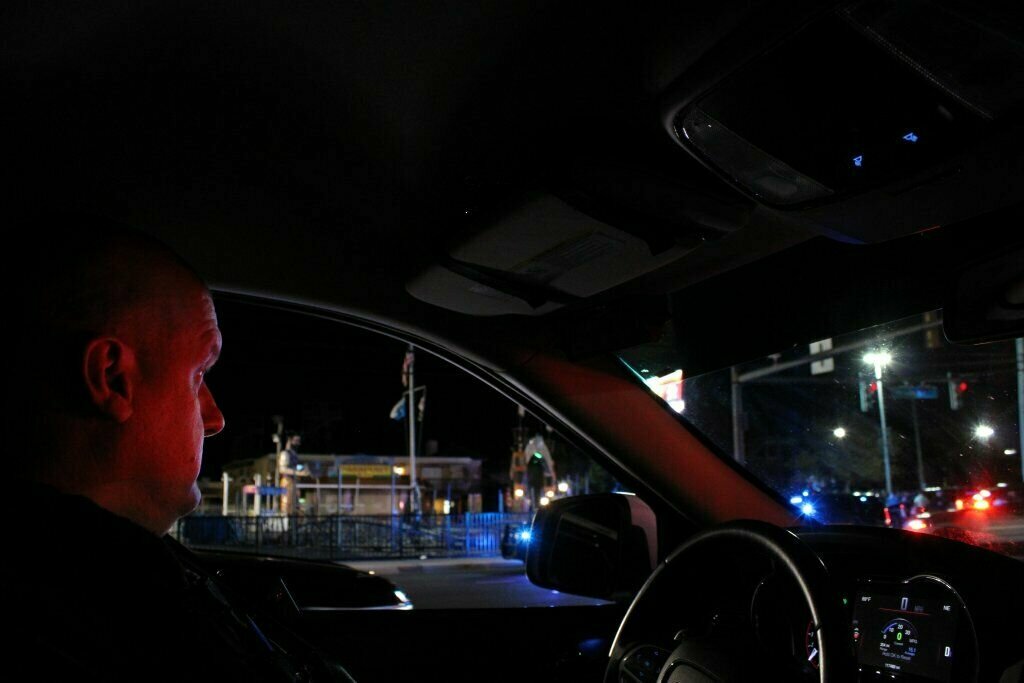This article was republished with permission from WTOP’s news partners at Maryland Matters. Sign up for Maryland Matters’ free email subscription today.

This content was republished with permission from WTOP’s news partners at Maryland Matters. Sign up for Maryland Matters’ free email subscription today.
Aside from the occasional, low drone of a revving engine, the town of Ocean City was quiet Friday evening — certainly not what Worcester County Sheriff Matthew Crisafulli (R) had anticipated.
“[The] pulse is much different so far than the previous two years,” Crisafulli said of 2021’s unsanctioned H2oi weekend from the backseat of a police cruiser.
Maryland Matters joined Crisafulli and Capt. Nate Passwaters as they patrolled Coastal Highway during the traditionally hectic social-media-generated modified car weekend.
Friday night brought more foot traffic than anything else as attendees lined the edge of Coastal Highway. Some wore costumes — cows and bananas were popular this year.
Nevertheless, there were 124 arrests by the Ocean City Police Department between Friday and Sunday evening, compared to 33 weekend arrests the week prior, according to the agency’s arrest log.
City records show that a wide majority of this weekend’s arrests were connected to H2oi and special event laws designed to make the town easier to police.
By contrast, the city police force reported 238 arrests during H2oi in 2020 — a particularly chaotic year.
As Passwaters cruised past the hub of Friday night’s activity, he pointed out the window at two non-descript-looking young men on the sidewalk. They were undercover officers who work with him in the drug enforcement unit of the Sheriff’s Office.
They flashed him a sly smile as he drove away.
In addition to the covert officers and what appeared to be a one-to-one ratio of police cars and souped-up cruisers, law enforcement had eyes all over: from a command center at the West Ocean City Park and Ride lot, officials monitored satellite cameras set up throughout town that had enough precision to clearly display license plate numbers.
State and local politicians passed through the command center to say hello and get updates on how the evening was unfolding.
Worcester County Commissioner Anthony W. “Chip” Bertino Jr. (R) was present both Friday and Saturday night. In a phone interview.
Sunday afternoon, he said that “for the most part,” the weekend “was much more quiet than last year.”
“For months, plans have been made and discussed to ensure that … the problems that were experienced last year did not occur again, and I think that that is a major tribute to our law enforcement agencies, our state’s attorney’s office and our elected officials in the area,” Bertino said.
“We’re just in a much better position this year,” state Sen. Mary Beth Carozza (R-Lower Shore) said to Crisafulli and Passwaters at the command center Friday.
In recent years, the locally dreaded event has drastically veered from its original spirit of appreciation for German engineered cars — so much so that its creator attempted to steer the swarm of modified-vehicle enthusiasts away from Maryland completely.
“[It’s] gotten bad in the last five to seven years,” Crisafulli said.
It’s also gotten a lot more dangerous.
In 2017, Passwaters was one of two officers hit by a car after approaching two people about suspected drug activity. Someone fired a shot at the other officer, he said.
“That was the year … the state took notice,” he said.
In 2018, Gov. Lawrence J. Hogan, Jr. (R) enacted an emergency bill that allows the State Highway Administration and local municipalities to designate special event zones in Worcester County.
An area can be designated as a special event zone during car-specific events that are anticipated to draw at least 1,000 attendees, and officials can reduce speed limits and increase fines for traffic violations.
During the 2020 legislative session, Carozza and Del. Wayne Hartman (R-Lower Shore) successfully co-sponsored a follow-up emergency bill to allow law enforcement to make misdemeanor arrests for exhibition driving — like the burnouts and drag races typically seen during these weekends — in special event zones, meaning higher fines and, in some cases, jail time.
In spite of the emergency legislation, the 2020 unsanctioned event became an enormous law enforcement challenge.
Passwaters said that people lobbed objects at officers from hotel balconies. Philadelphia Avenue was so inundated with people at last year’s event that it was basically impossible to move.
“You couldn’t even see the roadway in some of these areas, it was so hectic,” Crisafulli said.
After last summer’s event, Hartman pre-filed legislation that sought to add police officers and other first-responders as a protected class under the state’s hate crimes law.
The bill never made it out of the House Judiciary Committee.
“We’re human beings, too. We have feelings,” Passwaters said with a chuckle when asked what goes through his mind when confronted with riots like those that occurred last year.
Passwaters conceded that interactions like those in 2020 can impact a police officer’s commitment to the job.
“It can be — I’m not saying it is — but [it] can be demoralizing,” Passwaters said.
“We try to exhaust every possible way of defusing the situation without having to go hands-on with somebody,” he said. “So, if that’s a show of force” like hundreds of officers in riot gear, “so be it.”







